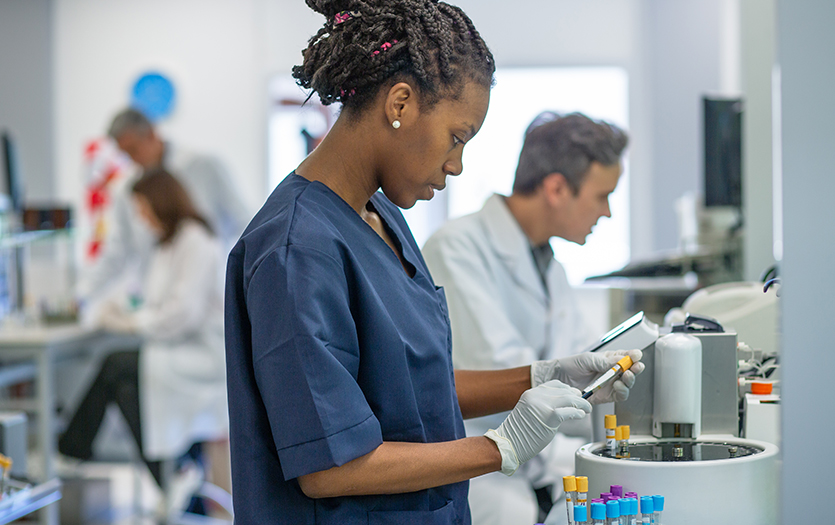
This post was written by Nicole Shankster, MLS(ASCP), Accreditation and Referral Specialist, Parkview Health.
Laboratorians nationwide provide patients and providers with essential health information every day. April 20-26, 2025, is Medical Laboratory Professionals Week, during which we recognize their indispensable role in informing evidence-based healthcare decisions.
What is a clinical laboratory?
A clinical laboratory is a facility where diagnostic or screening tests are performed on a patient's blood, body fluids and/or tissues to assist the healthcare team with diagnosis, treatment and prevention of disease.
Clinical laboratories can be found in a variety of healthcare settings.
-
Hospital labs are positioned in a centralized location within the hospital.
-
Reference labs are independent, off-site facilities that perform more complex or specialized testing.
-
A physician's office lab is located in a physician's office to perform simple lab tests.
Diagnostic specialties
Different departments within the lab specialize in specific types of diagnostic testing.
-
Chemistry tests a variety of body fluids for chemical substances such as lipids, proteins, electrolytes, glucose, enzymes and hormones.
-
Coagulation assesses bleeding and clotting problems.
-
Hematology is the study of blood and its elements.
-
Immunology and serology tests look for antibodies in your blood and focus on proteins made by your immune system.
-
Microbiology receives almost any type of clinical specimen and infected tissue to help identify the disease-causing microorganism(s).
-
Molecular diagnostics are tests that examine the genetic material in a specimen. These tests can detect genetic risk factors for certain diseases or provide evidence of infections in the body.
-
Point-of-care testing is performed at the patient's bedside, often by nursing staff.
-
Toxicology performs tests for recreational, illegal and prescription drugs.
-
Transfusion services (blood bank) determine blood groups and perform compatibility testing on blood donors and recipients.
-
Urinalysis is the physical, chemical, and microscopic examination of urine.
-
Pathology:
-
Cytopathology examines smears of cells from the body for inflammation, cancer and other conditions.
-
Histopathology processes tissue removed from the body for evaluation under the microscope.
-
Surgical pathology examines organs, limbs, tumors, fetuses and tissues biopsied in surgery.
-
The lab team
It takes a diverse team of professionals to ensure every sample is handled accurately and every result is reliable. This group includes:
-
Phlebotomists work with patients to draw blood, ensuring the correct tubes are collected for each test the physician orders. They can work in a hospital (in-patient) or clinic (out-patient) setting.
-
The processor is responsible for any special handling of the medical sample (e.g., blood, urine, stool, tissue, body fluid) that might need to be handled before testing can take place.
-
Clinical laboratory scientists perform testing and obtain results from medical samples. These test results help the provider diagnose and treat the patient. Clinical laboratory scientists are educated in many specialties (e.g., blood bank, coagulation, chemistry, hematology, microbiology, urinalysis) to analyze medical samples and detect abnormalities that might be present.
-
A pathologist is a physician who has completed medical school and has a doctor of medicine and pathology certification. Pathologists study the causes of diseases and analyze how they can affect people's health. They are also responsible for overseeing the laboratory.
-
The pathology assistant works directly with a pathologist to examine and report information about surgical specimens. They are responsible for examining and processing tissue samples, performing dissections, and documenting all observations.
-
The histology technician is responsible for preparing thin slices of tissue on slides for microscopic analysis by a pathologist. They also perform special staining, as ordered by the pathologist, to determine certain types of cancer or disease processes.
Laboratory accreditation
Providing accurate results and ensuring the lab is up to code are essential. Laboratory inspections guarantee that operations follow safety rules and meet the compliance standards of the licensing body performing the inspection. As part of the accreditation process, laboratories must be inspected initially and then every two years.
To learn more about Parkview's laboratory services, visit us here.



